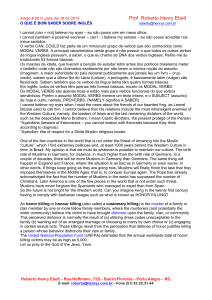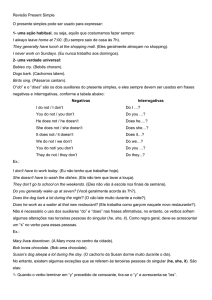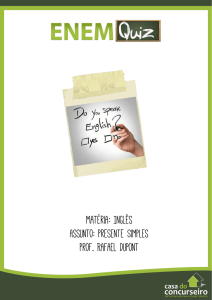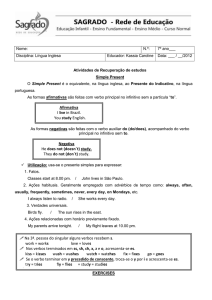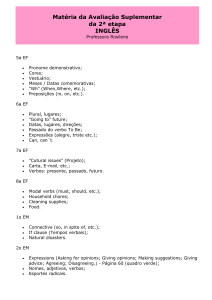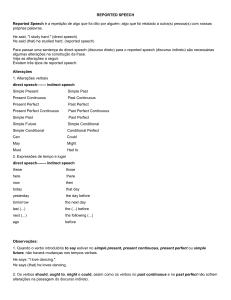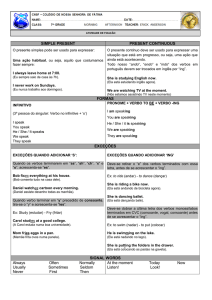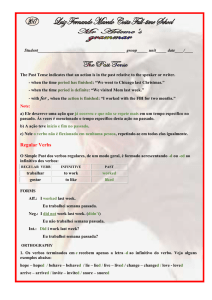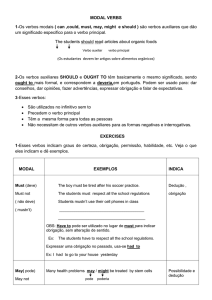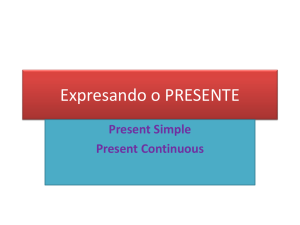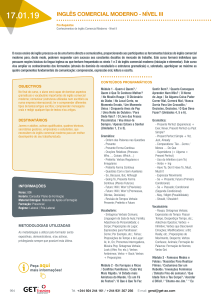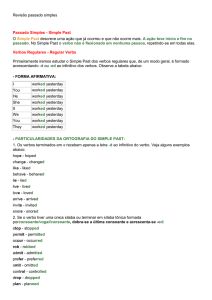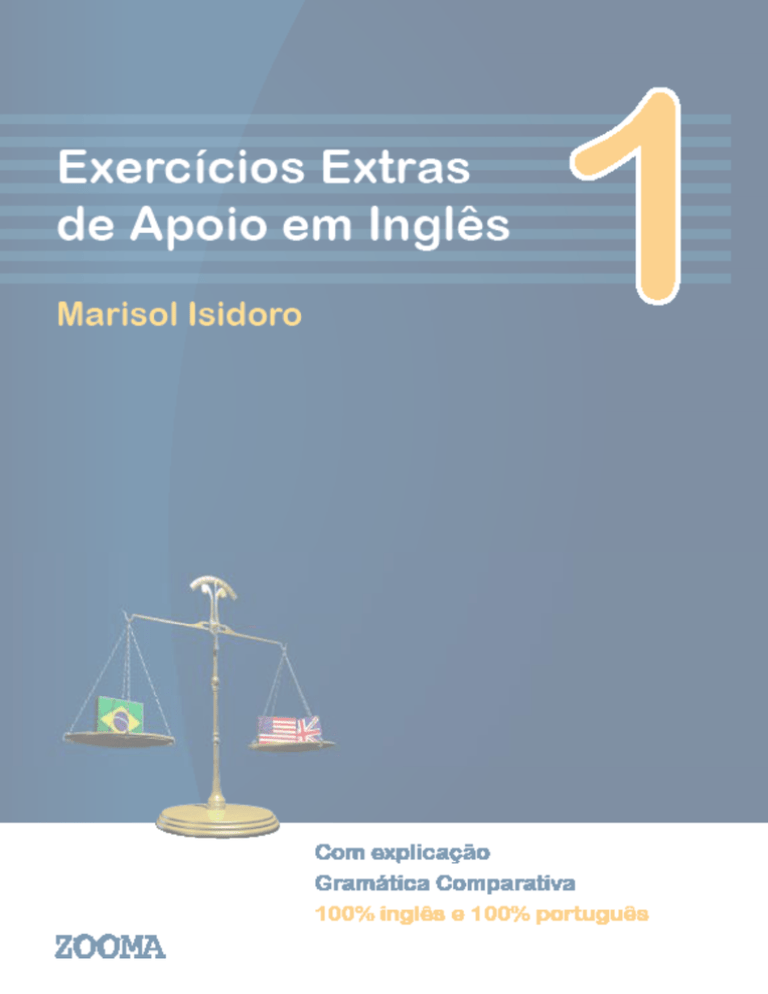
Dados internacionais de catalogação na publicação
Bibliotecária responsável: Mara Rejane Vicente Teixeira
Isidoro, Marisol
Exercícios extras de apoio em inglês 1 : com explicação
gramática comparativa 100% inglês e 100% português / Marisol
Isidoro. - Curitiba, PR : ZOOMA, 2015.
--- Kb ; ePUB
Inclui bibliografia e índice.
ISBN 978-85-65961-20-2
1.Língua inglesa – Gramática comparada – Português.
2. Língua portuguesa – Gramática comparada – Inglês.
3. Língua inglesa – Gramática – Estudo e ensino. 4. Língua
portuguesa – Gramática – Estudo e ensino. I. Título.
CDD ( 22ª ed.)
425
ISBN:
978-85-65961-20-2
TÍTULO:
Exercícios extras de apoio
em inglês 1 : com explicação
gramática comparativa 100%
inglês e 100% português.
EDIÇÃO:
1
ANO DE EDIÇÃO:
2015
TIPO DE SUPORTE:
E-book
PÁGINAS:
151
EDITOR(A):
Editora Zooma
PARTICIPANTES:
Marisol Isidoro
CAPA, PROJETO GRÁFICO E
DIAGRAMAÇÃO:
Roberta Blonkowski
TO BE: PRESENT TENSE
Ser ou Estar
THEORY 1
Affirmative.
FULL FORM
I AM
You ARE
He IS
She IS
It IS
We ARE
You ARE
They ARE
(eu sou, estou)
(você é, está)
(ele é, está)
(ela é, está)
(isso é, está)
(nós somos, estamos)
(vocês são, estão)
(eles são, estão)
CONTRACTION
EXAMPLE
I’M
You’RE
He’S
She’S
It’S
We’RE
You’RE
They’RE
I AM a doctor. / I’M here.
PRACTICE 1
Fill in the blanks with “TO BE”:
is
1. Peter .................................... a student.
2. He .................................... a good friend.
3. I .................................... a doctor.
4. I .................................... here.
5. It .................................... a lovely week.
6. Mary and John .................................... friends.
7. Joan .................................... at the hospital today.
8. She .................................... a doctor.
9. They .................................... in my group of students.
10. They .................................... students of English.
11. This .................................... a good material.
12. Today .................................... Sunday.
13. We .................................... in the Park.
14. You .................................... a good professional.
15. You and Henry .................................... English Students.
TO BE: PRESENT TENSE
Ser ou Estar
THEORY 2
The Negative
FULL FORM
CONTRACTION
I AM NOT a doctor.
You ARE NOT a doctor.
He IS NOT in the class.
She IS NOT a doctor.
It IS NOT a chair.
We ARE NOT secretaries.
You ARE NOT engineers.
They ARE NOT students.
I´M NOT
You AREN´T
He ISN´T
She ISN´T
It ISN´T
We AREN´T
You AREN´T
They AREN´T
PRACTICE 2
Fill in the blanks with the negative form of “TO BE”:
not / aren’t
open.
1. The doors are ....................................................
2. Joan and I are .................................................... sisters.
3. I am .................................................... a nurse.
4. We are .................................................... in the same school.
5. Peter is .................................................... working today.
6. Peter and you are .................................................... good friends.
7. Miss Prince is .................................................... a good athlete.
8. Mr. and Mrs Davis are .................................................... Canadians.
9. She and Peter .................................................... friends.
10. He is .................................................... a good friend.
11. The window is .................................................... closed.
12. They are .................................................... brother and sister.
13. They are .................................................... here today.
14. This is .................................................... an easy practice.
15. Today is .................................................... Tuesday.
16. We are .................................................... sisters.
17. We are .................................................... in class today.
TO BE: PRESENT TENSE
Ser ou Estar
THEORY 3
Question
Lembre-se que o verbo TO BE é auxiliar dele mesmo. Ele se move para frente do sujeito quando houver
uma interrogativa, exemplo:
AFFIRMATIVE:
QUESTION:
He IS an engineer.
IS he an engineer?
PRACTICE 3
Fill in the blanks with the question form of “TO BE”, and erase the verb from the original
place:
Are
1. ................................
Mary and he are in the same class ?
2. ................................ He is a good student.
3. ................................ They are dancers.
4. ................................ You and Joan are brother and sister.
5. ................................ Mr. and Mrs. Lewis are Australian.
6. ................................ He and Susan are students.
7. ................................ She is a good student.
8. ................................ The window is closed.
9. ................................ The doors are open.
10. ................................ They are new doctors.
11. ................................ They are athletes.
12. ................................ They are well today.
13. ................................ This is an easy practice.
14. ................................ This lesson is difficult.
15. ................................ Today is Monday,
16. ................................ We are busy today.
17. ................................ You are good students.
SIMPLE PRESENT TENSE / DO e DOES
THEORY 1
LEMBRE-SE: O SIMPLE PRESENT significa ROTINA. Você NÃO pode falar “Eu estou tomando café todo
dia”, mas sim “Eu tomo café todo dia”, ou “Estou tomando café agora”. Perceba que na terceria pessoa
do singular, HE, SHE, e IT, todos os verbos recebem um “S” no final, as outras pessoas não. Verbos
terminados em “Y”, com consoante antes do “Y”, além do “S” recebem “IES”. Veja:
I
You
He
She
It
We
You
They
work
work
workS
workS
workS
work
work
work
EXEMPLO COM “Y”
You studY every day.
He studIES every day.
You staY in a hotel.
He staYS in a hotel.
AUXILIARES DO
“SIMPLE PRESENT”
I
DO
You
DO
He
DOES
She
DOES
It
DOES
We
DO
You
DO
They
DO
Verbos que NÃO são TO BE, não se movem na frase como o TO BE, então precisam de outras palavras
que façam isso por eles para indicar se uma frase esta na afirmativa, negativa, ou interrogativa.
Estas palavras são chamadas de AUXILIARES que fazem parte do verbo. O tempo presente tem TRÊS
AUXILIARES: DO, DOES, e o HAVE ou HAS, quando estiverem compostos com outros verbos. O DO e
o DOES, quando auxiliares, não têm tradução, mas sim função: indicar se a frase é afirmativa, negativa
ou interrogativa. Há outro DO e DOES, mas estes não são auxiliares, mas simples verbos, um dos verbos
“fazer”, que serão estudados em outro exercício.
PRACTICE 1
Fill in the blanks with the present tense of the verb in parentheses.
singS at the church.
1. Paul (SING) ..................
9. He (PLAY) .................. volleyball on Saturdays.
2. Peter and his sister (STUDY) .................. here.
10.They (READ) .................. the news.
3. She (PLAY) .................. every day.
11.We (EAT) .................. in a restaurant every day.
4. Susan (WORK) .................. at the school.
12.You never (SIT) .................. beside me.
5. John (WALK) .................. in the park with me.
13.Helen (SPEAK) .................. French well.
6. Henry also (COME) ................. to school by bus.
14.Mrs Davis always (OPEN) .................. the door
7. Miss Davis always (SIT) .................. in that seat. 8. I (COME) .................. to work by bike.
of the car.
15.Many friends (PLAY) .................. chess with me.
SIMPLE PRESENT TENSE
THEORY 2
Exceções - terceira pessoa do singular.
LEMBRE-SE SEMPRE DAS SEGUINTES TERMINAÇÕES: SH, CH, SS, S, O, X, Z, e do Y.
Verbos e substantivos que terminam com estas terminações, recebem “ES” no final do verbo, quando estão
na terceira pessoa do singular. Veja:
WaSH
WatCH
GO
DreSS
BuzZ
StudY
She washES (verbo) the dishES (substantivo).
Hes watchES TV every day.
She goES to church on Sundays.
The mother dressES the child.
A bee buzzES.
He studIES English every day.
PRACTICE 2
Choose the best option:
1. Helen (PLAY, PLAYS) the piano very well.
2. Peter (DO, DOES) it very well.
3. Helen also (DO, DOES) this practice very well.
4. I (STUDY, STUDIES) every day.
5. I (WANT, WANTS) to speak English.
6. I (TRY, TRIES) to eat good food.
7. She (GO, GOES) to the park.
8. Andy (STUDY, STUDIES) every day.
9. Helen (WANT, WANTS) to speak French.
10. Mary (PLAY, PLAYS) the guitar.
11. Mr. MacPherson (GO, GOES) to work by car.
12. Mrs. Cowen (TEACH, TEACHES) Russian.
13. They (PLAY, PLAYS) volleyball on Sundays.
14. The audience (WATCH, WATCHES) the players.
15. He (CARRY, CARRIES) his tools in a box.
16. She always (GO, GOES) to the theater.
17. Henry and I (STUDY, STUDIES) English together.
18. Joan (CARRY, CARRIES) her baby in her car.
19. Mr Davis (TRY, TRIES) a new sport every week.
20. She always (EAT, EATS) too much.
SIMPLE PRESENT TENSE
PRACTICE 3
Rewrite the sentences below into the third person. You can use “HE”, “SHE”, or “IT”:
1.
2.
I do this business every day
..............................................................................................................................
3.
You have lunch at home.
..............................................................................................................................
4.
They go to the club with us.
..............................................................................................................................
5.
They go to school every day.
..............................................................................................................................
6.
We have dinner at work.
..............................................................................................................................
7.
I have two sisters.
..............................................................................................................................
8.
They like coffee.
..............................................................................................................................
9.
They carry the baby to class every day.
He carrIES the baby to class every day
..............................................................................................................................
You live in England.
..............................................................................................................................
10. I walk on the street every morning.
.............................................................................................................................. .
11. I swim very often.
.............................................................................................................................. .
12. They see Mr. Davis at work.
..............................................................................................................................
13. We study English every day.
..............................................................................................................................
14. They study English with me.
..............................................................................................................................
15. I study with Peter and Mary.
..............................................................................................................................
16. You teach Spanish.
..............................................................................................................................
17. They eat seafood at the beach.
..............................................................................................................................
SIMPLE PRESENT TENSE
PRACTICE 4
Question
Turn the sentences below into question form. Remove the “S”, “ES” or “IES” from the
verb if it is necessary:
Do
1. ................................
You help the teacher ?
2. ................................ They have many students.
3. ................................ She works a lot.
4. ................................ They carry the baby to class every day.
5. ................................ She does this business every day.
6. ................................ You have lunch at home.
7. ................................ They go to the club with us.
8. ................................ They go to school every day.
9. ................................ We have dinner at work.
10. ................................ You have two sisters.
11. ................................ They like coffee.
12. ................................ You live in England.
13. ................................ She walks on their street every morning.
14. ................................ They swim very often.
15. ................................ They see Mr. Davis at work.
16. ................................ We study English every day.
17. ................................ They study English with me.
18. ................................ He studies / .................................. with Peter and me.
19. ................................ You teach Spanish.
20. ................................ She stays with us.

